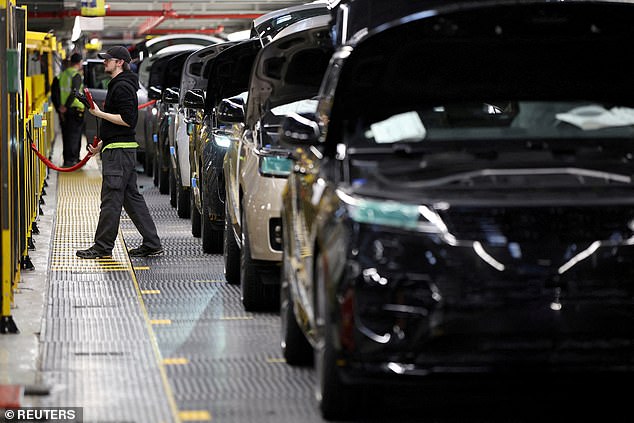Jaguar Land Rover (JLR) is not just another car company. It is a luxury motor manufacturer which under its Indian ownership and through brilliant design has bridged the gap between upmarket branding and large-scale manufacturing.
Its vehicles are entrenched in popular culture. There is no aspirational Netflix series in which Range Rovers do not play a role.
It is on the back of this that it ran up profits of £2.5billion last year and is reckoned to contribute £17.9billion to UK plc.
Small wonder then that its executives were doing cartwheels of joy in May after Keir Starmer, with the help of the silky skills of disgraced ambassador to Washington Peter Mandelson, managed to lift the tariff burden on JLR by reaching a Trumpian trade deal.
The Government knows the importance to jobs, exports and national output of a prolonged stoppage due to a cyber attack.
As serious as the assault on M&S and the Co-op proved to be earlier in the year, the path to recovery was not as threatening to output.

Hacked: Land Rover vehicles roll down the production line at the Jaguar Land Rover factory in Solihull. The company has been hit by a cyber attack that has forced it to suspend operations
So, it is not surprising that the Business Secretary Peter Kyle, a big upgrade on his predecessor, and the Chancellor Rachel Reeves are in daily conversation about how to deal with a crisis which will stretch into November.
JLR can take care of itself. The balance sheet is flush with cash, some £3.3billion at the last count.
It should be capable of making sure that cash flow problems don’t sink the army of small and medium-sized UK enterprises that are struggling.
Parent Tata Motors is far from being a pauper and sitting on top is one of India’s richest conglomerates.
But we shouldn’t be surprised if JLR plays hardball with a Government already subsidising steel operations at Port Talbot with £500million, plus some more recent skills add-ons.
Last time Labour was in office JLR came out with the begging bowl following the 2008 financial crisis.
The then Business Secretary, one Peter Mandelson, resisted the pressure. It is extraordinary that in the UK, the home of the world’s deepest high-risk insurance market, JLR chose not to take out cyber cover in the manner of M&S.
Followers of The Archers radio soap will have heard posh landowner Brian Aldridge being persuaded that cancelling environmental insurance cover is not a great money-saving idea.
The Government is highly susceptible to its union paymasters but should have no truck with Unite and other proposals for a Covid-style furlough scheme.
That might relieve pressure on the workforce but would drill an enormous hole in rickety public finances.
A proposal that the Government buy up the parts and then sell them back to JLR as it recovers looks ill-conceived and would carry many of the same risks of fraud thrown up during the pandemic.
Deploying the British Business Bank as a backstop, to guarantee loans by JLR to suppliers, would offer a credible solution.
Gifting taxpayer money to a rich firm should not be an option.
Smart money
The decision of Goldman Sachs-backed investment outfit Petershill Partners to de-list is being interpreted as another blow for the London Stock Exchange.
Petershill’s spiel was about providing broader access to alternative investments in hedge funds and private equity. That includes Clearwater, owner of Chelsea FC.
The decision more likely reflects dissonance in underlying asset classes. Private equity is selling firms public markets are no longer enamoured with.
Hedge funds, financed by debt, could be highly vulnerable to losses at a time when established lenders are nervous about credit quality.
That’s why free-float shareholders should take the payout and be grateful.
Reality cheque
Since the departure of Paul Johnson from the Institute for Fiscal Studies, the head of the Resolution Foundation, Ruth Curtice, has become the fashionable person for budgetary comment.
The IFS continues to churn out valuable research – and says that if the Government is to meet its pledge to Nato, increasing defence spending to 3.5 per cent of GDP by 2035, it must find £36billion, or £500 for every citizen.
Yikes!
DIY INVESTING PLATFORMS

AJ Bell

AJ Bell
Easy investing and ready-made portfolios

Hargreaves Lansdown

Hargreaves Lansdown
Free fund dealing and investment ideas

interactive investor

interactive investor
Flat-fee investing from £4.99 per month

InvestEngine

InvestEngine
Account and trading fee-free ETF investing
Trading 212
Trading 212
Free share dealing and no account fee
Affiliate links: If you take out a product This is Money may earn a commission. These deals are chosen by our editorial team, as we think they are worth highlighting. This does not affect our editorial independence.
This article was originally published by a www.dailymail.co.uk . Read the Original article here. .

